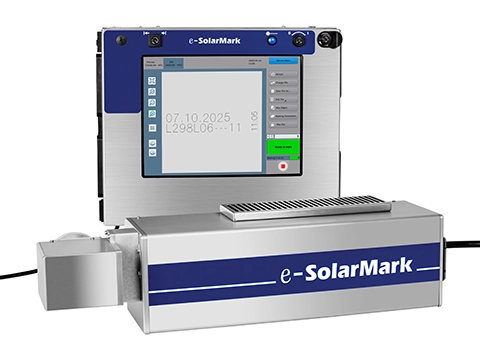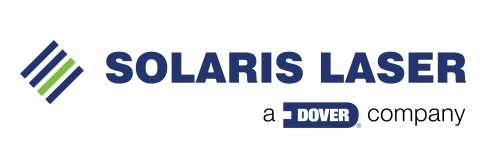Solaris Laser UV Laser Technology
Non-evasive UV marking for ultra-high precision.
Solaris UV laser (ultraviolet) technology permits the creation of minute and highly intricate marks and designs that never fade. Solaris Laser has over 30 years of experience innovating in laser technology with our UV marking exceling at the compliance and traceability demands of today’s production and retail sectors.
- Ideal for producing perfect 2D codes, including GS1 Digital Link
- Entirely non-abrasive for the most delicate substrates and applications
- Highly versatile for use across multiple substrates and industries
- Ink and contaminant-free marking lowers environmental impact of production

e-SolarMark+ eDLV
State-of-the-art UV laser technology for your most demanding applications
UV marking has the significant advantage of being exceptionally precise, allowing perfect reproduction of the minutest, most intricate details, including scannable 2D codes such as the GS1 Digital Link and other QRs. UV lasers operate at a shorter wavelength than CO2 or fiber lasers which allows the UV laser beam to be focused more finely, enabling it to create intricate and tiny high-resolution markings that are crucial in industries where clarity and precision are paramount.
UV lasers are often referred to as ‘cold lasers’ because their shorter wavelength allows them to mark materials with minimal heat generation. This cold marking process is a key advantage in applications where the substrate could be damaged by excessive heat, such as in the marking of heat-sensitive, high-density or delicate materials like plastics, including flexible films and foils, glass, and certain composites. Because UV laser beams interact with substrates at a molecular level, they create marks that are resistant to wear, fading, and environmental factors.
Ultraviolet technology is primed for sectors like cosmetics, food, and pharma, where UV laser use aids regulatory compliance and patient safety, reducing the possibility of counterfeit products and boosting brand protection. Across the breadth of industrial coding, including FCMG, where packaging materials can vary widely—from delicate plastics to robust metals—the cold marking capability of UV lasers ensures that the integrity of the material is maintained. For example, in the food and beverage sector, where plastic packaging is common, UV lasers can mark directly onto the packaging without causing deformation, discoloration, nor compromising the product inside. This is particularly important for maintaining the aesthetic quality of packaging, which is a significant factor in consumer purchasing decisions.
Solaris laser UV marking is also non-contact by nature, which is a significant advantage in maintaining the integrity and cleanliness of the product. Since the laser does not physically touch the surface being marked, there is no risk of contamination or damage to the product. This non-invasive process is particularly beneficial in industries where hygiene and product safety are critical, such as in food production, pharmaceuticals, and medical devices.
For example, in the pharmaceutical industry, where products must remain sterile, UV lasers provide a safe marking solution that does not compromise the product’s integrity. Similarly, in the food industry, non-contact marking ensures that packaging remains intact, without the risk of punctures or breaches that could affect the product’s safety and shelf life. The ink-free nature of ultraviolet laser technology is another defining factor in the cleanliness of the technology which also contributes to a reduced environmental impact in production.
Solaris UV laser for high versatility and contrast
The versatility of Solaris ultraviolet lasers is another major advantage, as they can mark a wide range of materials with consistent quality. Suitable substrates include: rigid metals; plastics; rubber; glass; ceramics; and even some organic substrates like wood, and the casing of cheeses and hard fruits, making UV an ideal choice for industries with diverse material requirements.
In the FMCG sector, packaging materials can vary not only between products but also within a single product line. For example, a single beverage product might involve plastic bottles, metal caps, and paper labels, all of which require clear and durable markings. Solaris UV lasers can seamlessly switch between these materials, providing high-quality, consistent marks on each one without the need for significant adjustments or changes in the marking process.
UV lasers are known for producing high-contrast and permanent markings, which are essential for ensuring that codes are easily readable throughout the product's lifecycle. In industrial applications, where products may be exposed to harsh conditions such as abrasion, chemicals, or extreme temperatures, the permanence of Solaris UV laser markings ensures that critical information like serial numbers, batch codes, and compliance marks, including tiny 2D codes, remain legible. This durability is vital for maintaining traceability, especially in sectors like automotive and aerospace, where components are subject to rigorous conditions and must be identifiable for safety and regulatory reasons.
UV marking also helps companies comply with industry regulations, particularly those related to product traceability and safety. UV’s ultra-high coding quality ensures compliance with stringent coding requirements in industries like pharmaceuticals and food. In the medical device industry, UV lasers can mark devices with unique identification codes (UDI) that are required for traceability throughout the product's life cycle, ensuring their tracking, authentication, and recall, if required.
Like other laser technologies, ultraviolet lasers are ink-free, reducing waste, including of chemicals, and environmental impact. This factor also saves the ongoing costs of consumables and their storage as well as the downtime due to their refills. Additionally, UV lasers have a long operational lifespan and require minimal maintenance, further reducing total cost of ownership (TCO) and downtime.
Solaris UV lasers also seamlessly integrate with Industry 4.0 systems of automated production lines and IoT devices, enabling real-time monitoring and adjustments to optimize production performance.
